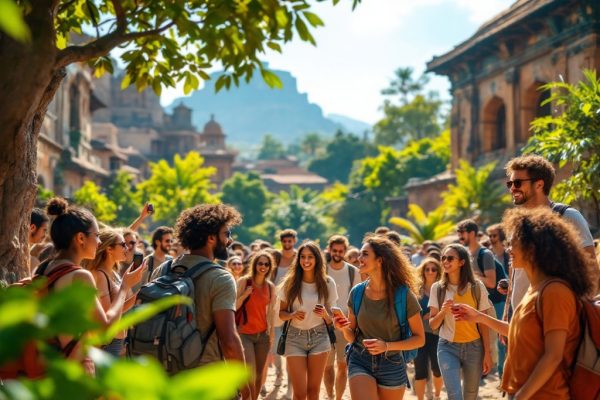The Impact of Educational Tourism on Local Communities
Discover how educational tourism empowers communities worldwide. It creates jobs, boosts local economies, and preserves cultural heritage. Explore the benefits of sustainable tourism practices, international collaborations, and immersive cultural experiences. Learn how educational tourism builds stronger, more resilient communities while offering enriching experiences for both visitors and residents. Read on to unlock the potential of educational tourism.
Important information

- Educational tourism boosts local economies by creating jobs, supporting small and medium-sized enterprises (SMEs), and improving infrastructure.
- It promotes cultural exchange and preservation through immersive experiences, fostering understanding and appreciation of diverse cultures.
- Educational tourism empowers local communities by involving residents in planning and management, leading to social development and poverty reduction.
- Sustainable practices are key, with responsible waste management and natural resource conservation minimizing environmental impact.
- International collaboration in educational tourism enhances learning through knowledge sharing and skill development, fostering global citizenship.
The Role of Educational Tourism in Local Community Development
Educational tourism significantly benefits local communities. It creates jobs and boosts economic growth while encouraging cultural exchange, strengthening local traditions, and empowering residents. Community involvement in tourism further enhances the local economy. Partnerships between educational institutions and local organizations are crucial, facilitating skill development and knowledge sharing, and building capacity for sustainable growth. Moreover, educational tourism improves local infrastructure and provides essential financial support. By offering authentic cultural experiences combined with learning opportunities, this type of tourism provides a rich and rewarding experience for both visitors and residents.
Benefits for the Community
- Creates jobs and stimulates economic growth.
- Fosters cultural exchange and strengthens local traditions.
- Empowers residents through community involvement.
- Improves local infrastructure.
- Provides essential financial support.
Partnerships and Growth
- Facilitates skill development and knowledge sharing.
- Builds capacity for sustainable growth through partnerships between educational institutions and local organizations.
- Offers authentic cultural experiences combined with learning opportunities.
How Educational Tourism Promotes Community Development
Educational tourism strengthens communities by connecting local groups and schools, fostering valuable partnerships that boost skills, knowledge, and support local projects. This influx of visitors benefits local economies, as tourists spend money at hotels, restaurants, and shops, creating jobs and stimulating growth.
Economic Benefits
Educational tourism boosts local economies. Tourists spend money at local businesses such as hotels, restaurants, and shops, creating jobs and stimulating economic growth.
Cultural Exchange
Educational tourism fosters cultural exchange and understanding. It builds community pride and encourages the preservation of local traditions. Tourists learn about local customs and the importance of protecting natural resources.
Educational tourism promotes responsible travel practices that benefit the environment and demonstrate respect for local cultures, contributing to sustainable development. Responsible management of this tourism ensures these benefits continue for years to come.
Economic Impact of Educational Tourism on Local Communities
Educational tourism significantly benefits local economies. It boosts revenue for businesses such as hotels, restaurants, and shops, leading to job creation and higher living standards for residents. This sector also promotes the growth of small and medium-sized enterprises (SMEs), reduces poverty, and supports essential infrastructure development, providing communities with vital financial resources.
Boosting Local SMEs and Economic Growth
English educational tourism (EET) significantly strengthens local economies, especially in rural areas, by benefiting small and medium-sized enterprises (SMEs). The increased demand for accommodations, food, and local attractions generated by EET boosts revenue and creates jobs in various sectors like hospitality and retail. These economic benefits, in turn, improve living standards and contribute to overall community development. EET provides crucial support to local businesses, fostering economic growth and sustainability within communities. The influx of students and educators creates opportunities for SMEs to expand their services and reach a wider customer base, ensuring long-term economic stability.
Employment Opportunities and Unemployment Reduction
Educational tourism stimulates local economies by generating diverse job opportunities. The increasing demand for tour guides, translators, and educators lowers unemployment and provides a path to economic advancement.
Infrastructure Development and Financial Support
Educational tourism strengthens local infrastructure. Schools often collaborate with travel agencies to fund projects and student sponsorships, fostering growth in educational tourism and enhancing community facilities.
Social and Employment Benefits of Educational Tourism
Educational tourism stimulates local economies by creating jobs and reducing unemployment. This empowers communities, fostering social development and alleviating poverty through increased income.
These factors combine to build stronger communities and improve overall well-being.
Community Empowerment and Resiliency
Educational tourism offers significant advantages for communities. It boosts community engagement and builds resilience, while also strengthening cultural identity. It encourages local involvement in the tourism sector, creating opportunities for community empowerment and offering robust support to these areas.
Social Development and Poverty Reduction
Educational tourism significantly boosts local economies, creating jobs and improving lives. For example, community members can find work as tour guides, in the hospitality sector, or selling local crafts. This increased economic activity raises living standards and reduces poverty. Furthermore, the influx of income can fund crucial community projects, further driving development and alleviating poverty. Careful planning is essential to ensure these projects benefit everyone involved.
Cultural Exchange and Preservation Through Educational Tourism
Educational tourism fosters cultural exchange, connecting visitors and locals through shared traditions, languages, and customs. This deeper understanding cultivates appreciation for diverse cultures. It also contributes to cultural preservation by supporting local artisans and funding cultural sites and traditions. Tourists delve into local history, exploring art and architecture, which further encourages preservation efforts. Immersive experiences like homestays and community-based tourism initiatives promote authentic interaction and contribute to the safeguarding of cultural heritage.
Immersive Cultural Experiences and Knowledge Acquisition
Educational tourism offers travelers immersive cultural experiences, allowing them to engage with local traditions and customs firsthand. Interacting with local communities fosters a deeper understanding and appreciation of diverse cultures, promoting global awareness. Participants gain knowledge and develop valuable skills through specialized learning opportunities, enriching their travel experiences.
Empowering Cultural Identity and Authentic Culture
Educational tourism strengthens cultural identities by fostering pride in local heritage. This encourages communities to both share and preserve their traditions, while also connecting them with international visitors, effectively bridging cultures.
Sustainable and Responsible Educational Tourism
Community-based tourism empowers locals by involving them in planning and management, ensuring they directly benefit from tourism revenue. This creates jobs for residents and boosts local businesses. Sustainable tourism practices, like responsible waste management and natural resource conservation, are essential for minimizing environmental impact. Promoting eco-friendly activities further contributes to this effort. Preserving cultural heritage is equally important, achieved through respecting local traditions and protecting historical sites. Educational tourism programs offer enriching cultural experiences for both visitors and locals, from traditional craft workshops and storytelling sessions to visits to cultural heritage sites. These programs provide unique learning opportunities and promote cross-cultural understanding. The core principles of community-based tourism are economic empowerment, environmental protection, and cultural preservation. They work together to create a sustainable and beneficial tourism model for everyone involved.
Community-based and Sustainable Tourism Practices
Community-based tourism ensures fair distribution of benefits by connecting tourism businesses with local residents. This sustainable approach protects both the environment and local culture through practices like responsible waste disposal and resource conservation, while also supporting local enterprises. Educational tourism further enhances these benefits by promoting environmental awareness among tourists and locals alike. Crucially, community involvement in tourism planning guarantees authenticity and maximizes the positive impact. Local guides, with their deep understanding of the area’s culture and environment, enrich the tourist experience. Partnerships between schools and local groups facilitate valuable skills and knowledge sharing, addressing local challenges and fostering community growth. Ultimately, sustainable educational tourism creates lasting positive change for everyone involved.
Benefits of Community-Based Tourism
- Ensures fair distribution of benefits by connecting businesses with residents.
- Protects the environment and local culture through sustainable practices.
- Supports local enterprises and economic growth.
Impact of Educational Tourism
- Promotes environmental awareness among tourists and locals.
- Guarantees authenticity and maximizes positive impact through community involvement.
- Enriches tourist experience with knowledgeable local guides.
- Facilitates skills and knowledge sharing through partnerships.
- Addresses local challenges and fosters community growth.
Global Impact and International Collaboration in Educational Tourism
Educational tourism fosters cultural exchange and global collaboration, creating incredible learning opportunities. International partnerships between institutions are essential for sharing knowledge and developing valuable skills. This enhances a nation’s standing while nurturing global citizenship.
Examples of benefits
- Student and faculty exchanges allow participants to learn from each other, broadening their perspectives.
- Joint research projects offer fresh perspectives, leading to deeper insights through comparative studies.
Impact
- These activities broaden horizons and cultivate cross-cultural understanding.
- Educational tourism promotes awareness of critical global issues.
- It encourages sustainable practices in both education and the tourism sector, contributing to a more interconnected world.
International Collaboration and Enhancing Education
International collaboration is the lifeblood of educational tourism, enriching learning through the exchange of knowledge and shared experiences. Students and educators alike gain a global perspective, interacting with diverse cultures and fostering greater understanding.
Educational institutions play a vital role, offering programs that attract international students while collaborating with local communities. This partnership creates enriching experiences that benefit both visitors and residents.










